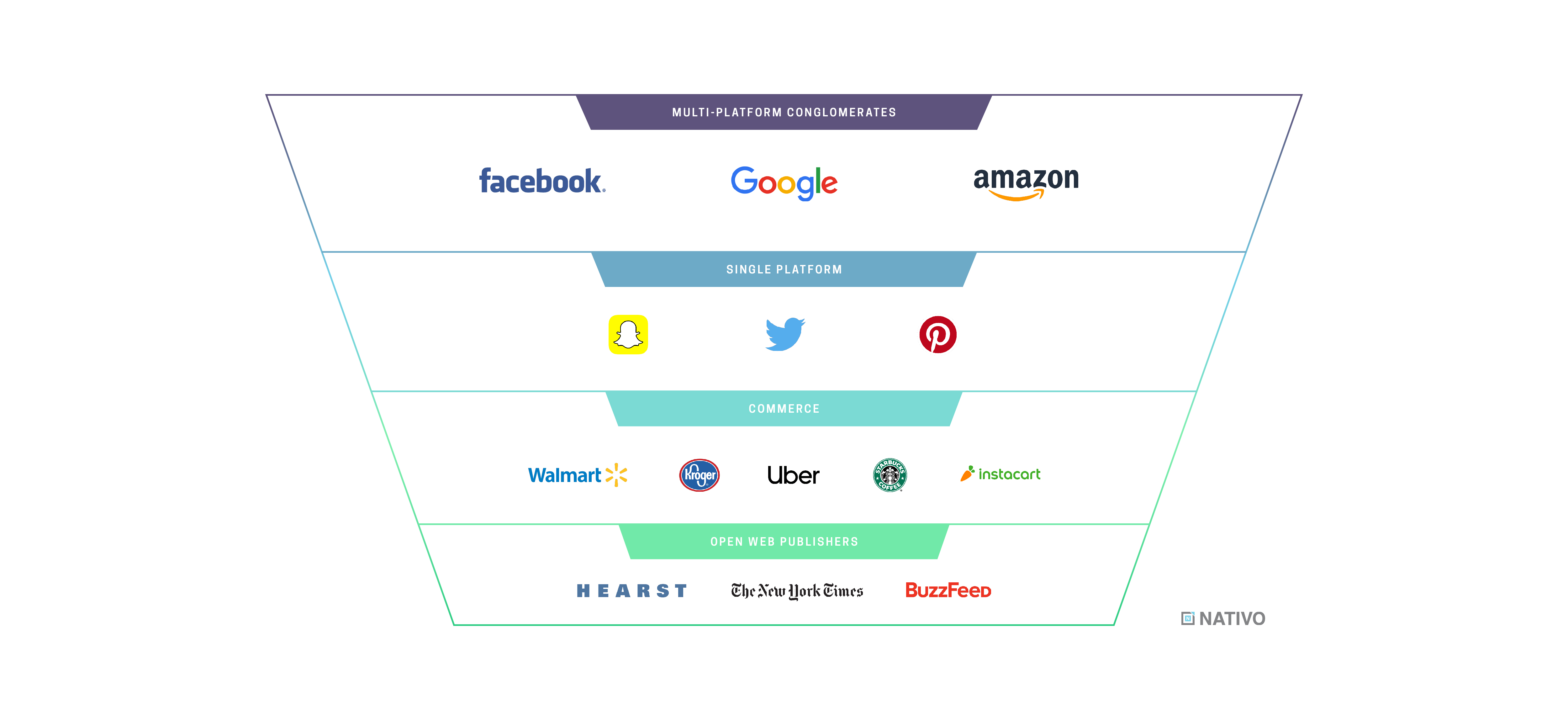Justin Choi
More posts from Justin Choi
The unchecked digital land grab for consumers’ personal data that has been going on for more than a decade is coming to an end, and the dominoes have begun to fall when it comes to the regulation of consumer privacy and data security.
We’re witnessing the beginning of a sweeping upheaval in how companies are allowed to obtain, process, manage, use and sell consumer data, and the implications for the digital ad competitive landscape are massive.
On the backdrop of evolving privacy expectations and requirements, we’re seeing the rise of a new class of digital advertising player: consumer-facing apps and commerce platforms. These commerce companies are emerging as the most likely beneficiaries of this new regulatory privacy landscape — and we’re not just talking about e-commerce giants like Amazon.
Traditional commerce companies like eBay, Target and Walmart have publicly spoken about advertising as a major focus area for growth, but even companies like Starbucks and Uber have an edge in consumer data consent and, thus, an edge over incumbent media players in the fight for ad revenues.
Tectonic regulatory shifts

By now, most executives, investors and entrepreneurs are aware of the growing acronym soup of privacy regulation, the two most prominent ingredients being the GDPR (General Data Protection Regulation) and the CCPA (California Consumer Privacy Act).
The GDPR, which went into effect last May and applies to any organization handling data of EU residents, represents the most comprehensive data protection laws in the world to date.
In the U.S., the CCPA goes into effect on Jan. 1, 2020, and will represent one of the most significant legislative privacy developments in the country. Like the GDPR, the CCPA’s impact will be global, given that California represents the fifth largest global economy.
Executives mustn’t miss the forest for the trees in trying to keep up with specific regulations. What’s most important for executives to understand about this wave of regulation is this: Going forward, the companies that succeed in obtaining and retaining consent to collect and use consumer data will be the ones that provide the clearest, most tangible value exchange for that data.
That’s where commerce companies come in.
A new advertising model
Much to the chagrin of regulators, new privacy regulations will benefit today’s largest online platforms, which have the needed resources to comply and already have a monopoly on digital ad spend.
However, on this backdrop of evolving privacy expectations and requirements, we’re seeing the rise of a new contender for ad dollars — ones with logged-in users and access to rich user data at scale that are building ad businesses by selling placements to major brands as well as SMBs. The entry of consumer-facing apps and commerce platforms into the realm of advertising continues the erosion of a long-standing dichotomy in the digital ad space.
Once upon a time, advertisers had two choices when it came to their digital spends: the open web (digital publishers) and the closed web (platforms), the latter of which took the lion’s share of ad dollars. These days, the bulk of ad spend still goes to the closed web, which now includes multi-platform conglomerates like Facebook and Google, as well as dedicated platforms like Twitter, Snap and Pinterest.
In this landscape, commerce companies are emerging as a new layer, falling squarely between platforms and digital publishers and creating a competitive power structure that looks like this:

Commerce companies will siphon some ad spend away from platforms, as they’ll be able to offer more-specific contextual environments and capitalize on areas of high intent (i.e., reaching a person who is grabbing an Uber, ordering food on GrubHub or buying groceries on Instacart). Ultimately, however, the commerce companies’ proposition to advertisers is going to take more dollars away from digital open web publishers.
Although these companies will always play a distinct role in the marketplace because of the contextual value of their content and ability to help create intent for advertisers, commerce companies are proving themselves to be more effective in capturing that intent through better ad experiences and use of data.
To cement their place in the ad revenue food chain, commerce companies are going to be learning from the best practices of today’s platforms while avoiding the legacy mistakes of open web publishers. In this regard:
-
They will rely almost exclusively on native ads, rather than highly scaled but questionably effective banners, in order to provide better experiences for users and better performance for advertisers.
-
They will place high value on contextual alignment.
-
They will not let data leak into the broader ecosystem or let third parties run amok in exchange for short-term gains.
-
They will capitalize on their logged-in users and provide deterministic ad targeting, versus relying on cookie technology that is being increasingly coming under pressure from web browsers and regulators.
-
They will tout the brand-safe nature of their offerings, avoiding the types of scandals that commonly arise around unfortunately placed ads on both the open web and social platforms.
But that’s not all. The rise of today’s commerce giants is being fueled by a number of forces, but their rise in tomorrow’s advertising landscape will be due in large part to their natural alignment with the sweeping privacy changes happening around the world right now.
The rise of commerce companies
As mentioned above, the data-driven future belongs to the companies that can demonstrate a clear and irresistible value exchange for consumer data. In that regard, today’s commerce companies have an advantage over today’s publishers.
The commerce company advantage is clear. When people buy products and services, they must provide the information necessary to pay for the transaction and have the goods or services delivered to them.
Similarly, many commerce companies operate successful loyalty programs through which consumers are happy to offer up their personal information in exchange for discounts, rewards and custom offers. These important programs elevate commerce companies above even popular social platforms like Facebook, which lacks the ability to offer tangible products or discounts in exchange for data.
In this respect, today’s commerce space encompasses far more than e-commerce and retail titans. Today’s commerce companies include all enterprises that are exchanging goods and services for money and valuable first-party consumer data.
Starbucks, Uber, Instacart and any number of disruptive direct-to-consumer brands are emerging as data-driven powerhouses that have the personal consumer connections required to succeed in a world where consumer data must be transparently and willingly given rather than purchased, bartered for or covertly obtained.
The construction of mini walled gardens

Commerce companies are presenting themselves as a new breed of “publishers” that deserve a sizeable digital ad investment—and they’re not hiding their intentions in the slightest. They’re actively seeking the tools and infrastructure needed for this massive transition. Just take a look at recent headlines:
-
Walmart to Acquire Technology and Assets of Polymorph Labs to Expand In-House Ad Technology
-
Watch out, Amazon and Walmart: Kroger is also building an advertising business
While all this jockeying for ad technology sends a clear message about these commerce giants’ intentions, it also underscores the fact that advertising is not yet built into these companies’ DNA. Ultimately, the path to success for these companies is not a straight one.
Ask any publisher, and they’ll tell you how hard it is to put in place the technology and verification systems required to appease advertisers in today’s era of transparency and viewability. It would seem that most commerce companies today are hoping to overcome these challenges through M&A activity, which could work—provided they understand the importance of proper integration within and throughout their legacy operations.
Ultimately, they must get this ad tech piece right. A wrong move could cause speed and latency problems that would not only sink advertising dreams but also threaten their core commerce businesses.
Furthermore, these companies will be operating direct advertising businesses, which means they have to not only buy or build ad tech, but they also need to work with brands and agencies and even (gasp!) hire ad salespeople.
Given how vital the uniqueness of their first-party data assets will be to their success, commerce companies won’t be making the same mistake as the online publishers that came before them: They won’t be opening up their audience data to third parties, thus commoditizing their most valuable asset. Rather, each commerce titan will fortify their own walled garden statuses, a la Facebook, and have to solve (or not) the issues of attribution and data portability for themselves.
In the meantime, advertisers will likely be asked to take campaign results at face value on each platform. Provided commerce platforms are thoughtful in the ad formats they roll out—avoiding interruptive, obtrusive display units in favor of more-integrated experiences—there’s every reason to believe that the performance on these properties could be sufficient to stave off advertiser irritations over a lack of transparency.
Moving meaningfully into the digital ad business is a formidable task, but the summit is worth the climb. In a world of rising customer acquisition costs, these companies are highly motivated to get it right.
After user growth wanes, these companies need to raise the lifetime value of their current users, and the easiest way to do that across their entire user base is via advertising. In other words, as these companies are pressured to continue to grow, companies like Uber will be shifting advertising from a side interest to a core area of focus.
Thanks to their clear value exchanges with consumers, as well as the benefit of hindsight and the luxury of today’s digital technologies, commerce companies are well-positioned to make a serious move for brands’ digital ad dollars right now. Without a doubt, in five years, the slicing of the ad revenue pie in our brave new privacy-centric world will look a lot different than it does today.































Comment